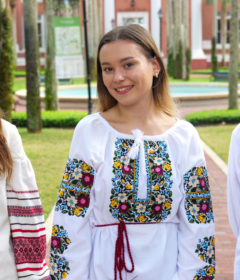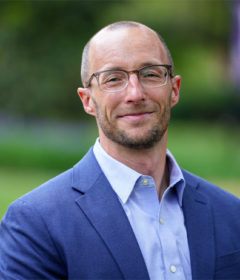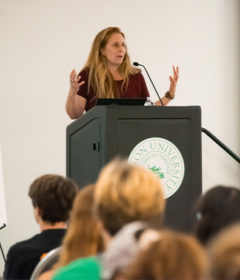Falling Down to Stand Out
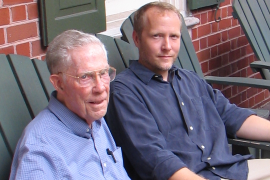

This article appears in the Spring 2018 issue of Stetson University Magazine.
When I took over as director of the University Honors Program at Stetson back in 2005, it was a paradigmatic program. It carefully adhered to every articulated expectation of the National Collegiate Honors Council’s “Basic Characteristics of a Fully-Developed Honors Program,” as elaborately outlined in some publication of the Honors Council dating to 2001. (I found the article hiding in my desk!)
In 2005, Stetson offered eight innovative, team-taught, interdisciplinary Honors courses, one for every semester a student attended Stetson. The courses were codified, systematized, sequential, consecutive and arranged to “maximize student outcomes.” Honors classes accounted for exactly half of a student’s credit hours during his or her career at Stetson.
We had a stellar program on paper! Man, what a wreck of a program it was in reality. Seriously.
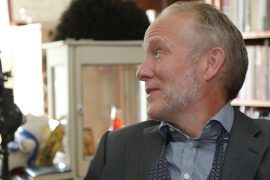
The first day I became the director, students from the Honors 3 class nailed a list of grievances — a la Martin Luther’s chapel in Germany — to my door. (The hole is still there.) I think I crumpled and threw the list at Greg Nolan, one of its authors, in exasperation.
Students were unhappy but couldn’t quite articulate what they resented. Faculty were dissatisfied but couldn’t quite articulate their dissatisfaction. We had a 75-percent dropout rate. (I tried to cast it in a better light: a 25-percent retention rate!) No faculty member wanted to teach the “brats.”
A couple years of emergent care later, we were still in crisis. It was 2007, so we celebrated the 50th anniversary of Honors at Stetson. (That makes this year the 60th.)
I did some research on the emergence of Honors back in the 1950s and found a history of the program’s founding, as outlined by John Hague, Ph.D., director of the Honors Program during the 1960s. Hague was a widely admired teacher, scholar and academic leader who led Stetson’s application to earn a chapter of Phi Beta Kappa in 1982, the first chapter established at a private university in Florida. Excerpted, his description read:
In the spring of 1956, Dean William Hugh McEniry decided that Stetson ought to have an Honors Program. After consulting with several faculty members, he announced the formation of a program, which in the first year would only be available to rising seniors. In the fall of 1956, Mary Ann Coslow, Rod Dugliss, Sid Knight, John Morgan and John Riser became the charter members of the Program. John Hicks was named the faculty director. The students were, upon entering the Program, forgiven whatever requirements were at that time unmet, whether general or departmental in nature. Each student proposed a senior project and asked three or four faculty members to supervise it. […] During the year, the students wrote a number of short papers related to the major project and discussed each with the members of the committee. A major paper brought the year’s work to an end. All of the work was ungraded: Successful completion of the projects was noted by H’s on the students’ transcripts. An H meant simply that the work completed was of Honors caliber.

It’s hard to imagine how different the world, Stetson and the Honors program must have been in 1956. Eisenhower. Elvis Presley. Khrushchev denounces Stalin. Segregated buses. And, in the midst of all that, maybe as a result of all that, the Honors Program was really radical.
Requirements were forgiven. Students were allowed to, you know, explore their education. Make their own choices. In 2007, we couldn’t possibly be so progressive as we had been in 1956.
What John Hague didn’t say in the “official” history is that all five students “failed.” Yep. They were graded as “non-Honors caliber.” I don’t know how, but they graduated, nonetheless.
When I got the list of alumni in 2007, all five graduates of the first Honors class were still alive. Four of them were doctors (some the real kind, some the medical kind). The fifth, for his sins, had become a well-regarded lawyer.
About that time, Hague got a letter from one of the original Honors class members, Rod Dugliss ’57, who was then the dean of the School of Deacons for the Episcopal Church in California. He shared it with me.
Here’s a bit of what Rod Dugliss said: “The Honors program gave me a foundational experience of the excitement and adventure of learning — of ‘education’ as learner driven. It gave me the courage to take risks in thought and life. It gave me an understanding of learning that informed all my teaching, to the present moment. It made lifelong learning an imperative. I know the program is now quite structured. I am so grateful to have had the experience of the radical freedom of its beginnings. You, and those who conceived the program and then worked to make it real, did a marvelous, indeed, unique thing.”
This struck me. Not like a bell or a pretty picture. Like a lightning bolt. I knew what had to happen. I had to destroy the Honors Program.
It took the better part of five years to destroy it. Maybe predictably, it was as hard to tear down as it was to erect. I’ve tried my best to return the program to its roots, as “learner-driven,” a program that would give students courage.
The “new” Honors program, as of 2017, is as close to the “old” one as possible. There are hardly any requirements in the “new-old” program; we just require that students find their own way, find their own challenges. I tell them all the time that we give them the freedom to figure it all out, and just enough support to do it. Whatever it is.
Smart kids don’t like being told what to do. They like to do it themselves. They aren’t afraid of mistakes. They stand back up when they’ve fallen down.
In fact, they like falling down.
-Michael A. Denner, Ph.D.
Editor’s note: Michael A. Denner, Ph.D., is director of the Stetson University Honors Program and a professor of Russian Studies.

